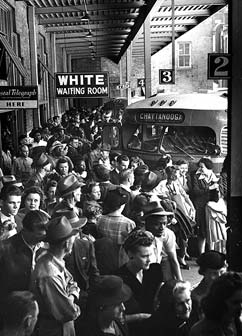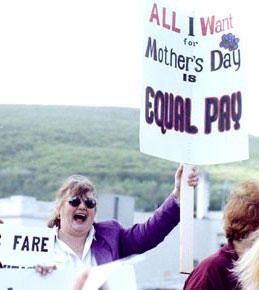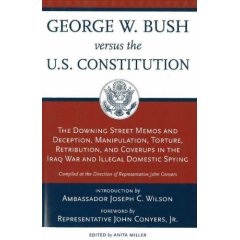
Back to Americans For Morality Home Page
Civil Rights When the United States was forming, debate raged about what kind of country we should have. Some believed the Rousseau argument that "people were basically good" and others supported the argument by Hume and others that the "natural man" tended toward evil. The first group tended to err on the side of asking people to be "personally responsible" and the second group wanted to ensure that we had certain specific "unalienable rights." The arguments between Rights and Responsibility have continued for hundreds of years on this continent.
When the United States was forming, debate raged about what kind of country we should have. Some believed the Rousseau argument that "people were basically good" and others supported the argument by Hume and others that the "natural man" tended toward evil. The first group tended to err on the side of asking people to be "personally responsible" and the second group wanted to ensure that we had certain specific "unalienable rights." The arguments between Rights and Responsibility have continued for hundreds of years on this continent.  It's all well and good that men should act responsibly...but, what if they do not? What protects the weakest of us from the strongest or the minority from the majority? Should the least of us be protected in a free society? Or do we believe in social Darwinism? In other words is it "survival of the fittest?" Not in America. "We hold these truths to be self evident, that all men are created equal, that they are endowed by their Creator with certain unalienable rights. "
It's all well and good that men should act responsibly...but, what if they do not? What protects the weakest of us from the strongest or the minority from the majority? Should the least of us be protected in a free society? Or do we believe in social Darwinism? In other words is it "survival of the fittest?" Not in America. "We hold these truths to be self evident, that all men are created equal, that they are endowed by their Creator with certain unalienable rights. " Here are some basic civil rights questions every Republican should answer:
Here are some basic civil rights questions every Republican should answer:  Recently the Republicans, in spite of being in control of all three branches of government, could not come to consensus on an immigration bill. Why? Because arguments ensued between the two sides of the Republican party, the side that are isolationists and want to build a wall, and the fiscal Republicans who like to hire cheap labor so their businesses can grow. Unfortunately, both sides are racially divisive. One simply doesn't want other races and peoples to "infest" America and the other sees those from other lands as quasi slave labor. They support outsourcing for the same cheap labor so that as long as the sweat-shops are in foreign countries somehow they are not really sweat-shops.
Recently the Republicans, in spite of being in control of all three branches of government, could not come to consensus on an immigration bill. Why? Because arguments ensued between the two sides of the Republican party, the side that are isolationists and want to build a wall, and the fiscal Republicans who like to hire cheap labor so their businesses can grow. Unfortunately, both sides are racially divisive. One simply doesn't want other races and peoples to "infest" America and the other sees those from other lands as quasi slave labor. They support outsourcing for the same cheap labor so that as long as the sweat-shops are in foreign countries somehow they are not really sweat-shops. Unfortunately, there are more blacks in poverty as a percentage of their race than any other ethnic group, which is not a surprise considering they had for so many years been cut out of the "American dream." Slavery can do that. But what Republicans fail to realize, is that it can continue to do that for generations, even after its abolition. You can see it in the bigotry in housing and lending practicies, for example. Somehow, many conservatives believe that opportunities are suddenly available to all blacks and that bigotry is suddenly abolished as well. But if it is not, they often do not care about that either. Why? Because it interrupts the "free market" in their minds. You see, they believe that if an employer wants to be a bigot and not hire someone because of their skin color or race, that in the market place, he has that right. He is the one taking the risk, they say. But if you live in a part of the country where most people are bigots, and blacks cannot get jobs at all then what are they to do? Sell their 40 acres and a mule the government promised to give them when slavery was abolished?
Unfortunately, there are more blacks in poverty as a percentage of their race than any other ethnic group, which is not a surprise considering they had for so many years been cut out of the "American dream." Slavery can do that. But what Republicans fail to realize, is that it can continue to do that for generations, even after its abolition. You can see it in the bigotry in housing and lending practicies, for example. Somehow, many conservatives believe that opportunities are suddenly available to all blacks and that bigotry is suddenly abolished as well. But if it is not, they often do not care about that either. Why? Because it interrupts the "free market" in their minds. You see, they believe that if an employer wants to be a bigot and not hire someone because of their skin color or race, that in the market place, he has that right. He is the one taking the risk, they say. But if you live in a part of the country where most people are bigots, and blacks cannot get jobs at all then what are they to do? Sell their 40 acres and a mule the government promised to give them when slavery was abolished?
 According to the Department of Labor, Women on average make 76¢ on the dollar to men (59¢ for physicians) but even more interesting is that they make even less in Republican areas and more in Democrat areas. Washington DC for example is at 95¢ while Utah and Wyoming are below 70¢. Why is this? The so-called religious right claims that women shouldn't really be in the workplace to begin with. Why? Because many believe women were created by God to make babies and stay in the home and giving them an equal wage would be an incentive for them to leave the home. There is no need to debate a woman's ability to bond with her children over men. But it is quite a different thing to treat women as a sub-class.
According to the Department of Labor, Women on average make 76¢ on the dollar to men (59¢ for physicians) but even more interesting is that they make even less in Republican areas and more in Democrat areas. Washington DC for example is at 95¢ while Utah and Wyoming are below 70¢. Why is this? The so-called religious right claims that women shouldn't really be in the workplace to begin with. Why? Because many believe women were created by God to make babies and stay in the home and giving them an equal wage would be an incentive for them to leave the home. There is no need to debate a woman's ability to bond with her children over men. But it is quite a different thing to treat women as a sub-class. Give me your tired, your poor,
Give me your tired, your poor,  Privacy is one of the foundations of a free society. You will not hear this from many Republicans. However, many of the rights granted to us in the Constitution are based on this right. Although Republican pundits like Rush Limbaugh trumpeted the idea that we "have no fundamental right to privacy," this didn't stop him from claiming this right to seal his medical records in Florida when the government came after him for his obtaining pharmaceuticals to maintain his drug addiction.
Privacy is one of the foundations of a free society. You will not hear this from many Republicans. However, many of the rights granted to us in the Constitution are based on this right. Although Republican pundits like Rush Limbaugh trumpeted the idea that we "have no fundamental right to privacy," this didn't stop him from claiming this right to seal his medical records in Florida when the government came after him for his obtaining pharmaceuticals to maintain his drug addiction.  Recently, the rights of privacy have been under attack, especially since 9/11 and the passing of the Patriot Act (passed without having been read by the majority of Congress). The reasoning behind this act has been explained to us by Republican leadership by telling us that we need to "give up some of our rights in order to maintain freedom." Unfortunately they have forgotten the words often attributed to Benjamin Franklin "The man who trades freedom for security does not deserve nor will he ever receive either" or the words known to be from Franklin, "Sell not virtue to purchase wealth, nor Liberty to purchase power."
Recently, the rights of privacy have been under attack, especially since 9/11 and the passing of the Patriot Act (passed without having been read by the majority of Congress). The reasoning behind this act has been explained to us by Republican leadership by telling us that we need to "give up some of our rights in order to maintain freedom." Unfortunately they have forgotten the words often attributed to Benjamin Franklin "The man who trades freedom for security does not deserve nor will he ever receive either" or the words known to be from Franklin, "Sell not virtue to purchase wealth, nor Liberty to purchase power." Back to Americans For Morality Home Page
 George W. Bush Versus the U.S. Constitution:
George W. Bush Versus the U.S. Constitution: